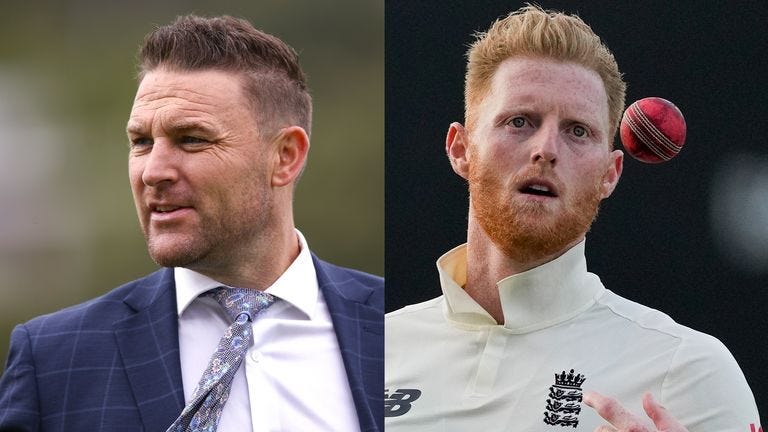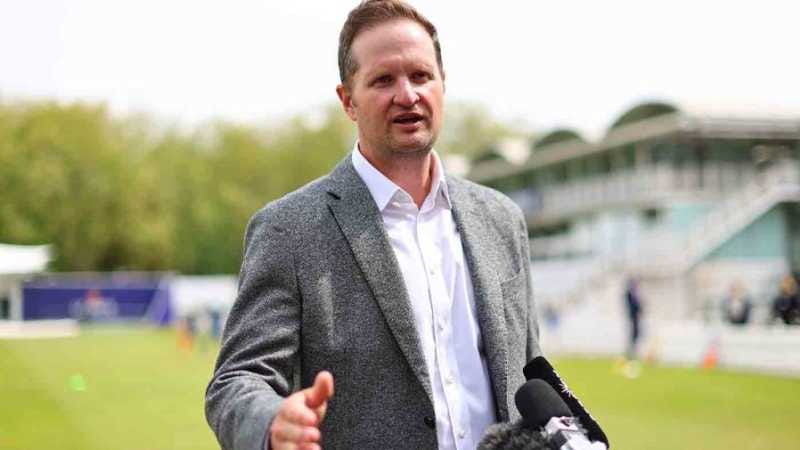OK, finally back to some scribbling. That earlier hiatus was medicinal, to me, this pause in transmission though, was not so pleasant! You guessed it, no nasty details required, just glad to be out the other side. Yes, new projects were promised, nothing changes there, just needing to get back to the desk and build some momentum - crass coach speak! So here’s a start … Thanks for being here.
It’s hard not to place great value in the belief that Brendon McCullum and Ben Stokes could be a perfect match. After all - the coach could be the captain, and the captain might be the coach. A contentful relationship beckons. ‘The End’
Thankfully not, the end has been too long in the making; instead, optimistic anticipation abounds. It is time for this England cricket team to find its identity.
McCullum, the coach, presents as progressive and bold in his thinking. He is not a career coach - bravo; and he is suitably removed from the game to not carry any unnecessary baggage into the role. A welcoming combination.
Stokes, the captain, will be dynamic and opportunistic in everything he undertakes. This is his modus operandi, and will serve him well as he embarks on an uncharted path - a positional change not anticipated. He too, will be traveling light.
The aforementioned role reversal would see; McCullum, the captain, as a leader who galvanised New Zealand into the team they are today, robust and committed to being the best they can. And, Stokes the coach, well, we should know this might, and should never eventuate!
Contentful relationships conjure thoughts of longevity, a sharing of traditional values, enduring companionship - in 2022 - is this what English cricket needs?
No, there is almost a need for this couple to embrace rakish behaviour on a mutual level. I wish for a shared desire to move away from the stale narrative that has engulfed this predictable English cricket team. I believe this somewhat inappropriate approach is required. After all, it is 2022 - the constitution of relationships has changed.
Enter the third player of this fledgling triumvirate.
Rob Key, managing director of the England cricket team. In fact, Key is the inaugural member, arbitrarily plucked from a commentary box to fill a void that seemed as wide as a Steve Harmison loosener.
As said previously … “Key, the former Kent captain, turned broadcaster, has plenty on his proverbial plate. His administrative experience appears as thin as the candidate pool he rose from.”
One task removed from Key’s portfolio was the firing part of starting a new role. Hiring and firing are rightfully aligned, however, in Key’s case, there was barely a soul left to fire, so it was the hiring that occupied his thinking. Pleasingly, his musing seems to have been cerebral, and thoughtful.
So far, so good.
Let’s be honest, as we always should. Key’s decision-making to date has left his predecessor looking like the instigator of American prohibition.
That predecessor, Ashely Giles, stumbled from one howler to the next. There is really no need to rehash the Giles bloopers, so we can contently leave it there, with a caveat that there should be no doubting his initial intentions. Giles seems a sensitive soul.
In the absence of suitable opposition, Stokes' appointment as captain seemed a straightforward, and logical decision. In isolation, yes. Still, now we can see there was more to Key’s thinking than just plugging the dyke. Any captain/coach relationship can be precarious, as we saw in the case of Australia; Justin Langer vs Patrick Cummins. Here was a team close to perfect, yet not compatible from an internal point of view. The captain/coach relationship is a sum of two parts, if there is imbalance there can be issues. In the case of Australia there was; and the rest is history.
In bringing Stokes and McCullum together (note: Stokes precedes McCullum) - Key is categorically shunning the text-book. Previously, more traditional England captains have been periodically interspersed with what could be perceived as left-field choices.
Andrew Flintoff being the last; he followed a thick blue blood line: namely - Mike Atherton, Nasser Hussain and Michael Vaughan, although Vaughan might argue differently. Atherton and Hussain less so.
Before that, Ian Botham was bookended by: Tony Grieg and Mike Brearley and later, Bob Willis and David Gower. It’s fair to say, neither Botham nor Flintoff prospered in their leadership roles.
Botham and Flintoff shaped as kindred spirits, and captaincy seemed an unnecessary burden to their peerless all-round ability. Fortunately for them, and England, they moved away from responsibility as quickly as they found it. Perusal of their post-captaincy form suggests those termination decisions were vindicated, if not welcomed.
Writing, as we speak, evokes thoughts, and confirmation of an entirely separate essay on Botham, Flintoff, captaincy, and the gate-keepers who presided over them. More on this later, perhaps.
However, let's get back on track.
So, how will the Stokes/McCullum partnership differ? And, yes, there was no mention of the corresponding coaches above, the reason being is their comparative insignificance to the present captain/coach partnership dynamic.
Firstly, in the dressing room space Stokes seems to have been a notoriously lethargic listener, much preferring actions over words. He has overtly shown his inability to engage in overplayed team theory, and participate in planning both individually, and on a team level (although, this has not hindered his individual output).
So, on reading part of McCullum’s transcript from his ‘Spirit of Cricket’ address in 2016, one could deduce that one is the other’s alter ego.
Paraphrasing … McCullum was talking of his influence as captain on an equally maligned New Zealand team, at that time.
“For us as New Zealand cricketers we wanted to remove a lot of the analysis; we wanted to be 'blue collar' in how we went about things, not aloof and superior.” “We planned less, had fewer team meetings and we tried to be the very best we could be.” “We wanted to be a team that people could be proud of; and if in doubt we wanted to play the game aggressively, not fear failure.” “Everyone bought into it and lived and breathed it.”
Stokes' desire to cut the fluff is shared by his partner, and surely we must be stimulated by the potential of Stokes and McCullum's union. After all, what could be worse than the previous two years of desperately mind-numbing leadership. Leadership, not just confined to Joe Root, more, across the board leadership, that has England firmly at the bottom of the Test match ladder.
‘Rob Key, you have begun adequately’ you can hear the Englishness in those words. These of course are fictitious, plucked from the ether by your scribe. Still, they are likely to be closer to reality than we might think.
A moderation of praise that is deafening in their insincerity. A hypocrisy of relevance, which in itself, is typical of an imperial English attitude. Those gate-keepers can remain anonymous, Sir Andrew Strauss, aside, because in this model no lauding is necessary, just room to breathe, space to work without hindrance.
Key has done everything asked of him to date; he has probably surprised himself in his clarity of thought and decisiveness. Nonetheless, plaudits aside, he has managed to shine a brighter, more optimistic light on what was until recently, a dark cold place.
English cricket will be better for this engaging triumvirate. Messers: Stokes, McCullum and Key have plenty ahead of them, I urge them not to look back, instead find a supporting cast who firstly wants to be on stage, and then direct them towards a memorable first night, and beyond.






